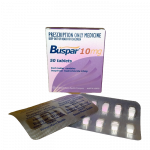Disulfiram (Antabuse): Uses, Dosage, Benefits, How it works, Side Effects

What Is Disulfiram (Antabuse) And What Does It Treat?
Disulfiram (Antabuse) is a medication used in the treatment of alcohol use disorders by producing unpleasant side effects and sensitivity to alcohol. It is designed as a deterrent to drinking. When alcohol enters the body, it is converted into acetaldehyde and then into acetic acid.
These unpleasant effects that occur even small amounts of alcohol are consumed include flushing of the face, headache, nausea, vomiting, chest pain, weakness, blurred vision, mental confusion, sweating, choking, breathing difficulty, and anxiety.
Symptoms of alcohol dependence include:
• Being unable to quit using alcohol despite problems with health and relationships
• Requiring more alcohol to achieve the same effect
• Presence of withdrawal symptoms (headache, sweating, shaking, nausea, vomiting, racing heartbeat, anxiety) when unable to use alcohol
• Spending the majority of time using or finding a way to use alcohol
• Having a desire but an inability to decrease the amount of alcohol used
• Giving up enjoyable activities in order to use alcohol
How Disulfiram (Antabuse) works
Disulfiram (Antabuse) works by blocking the breakdown of alcohol in the body. This leads to a buildup of a toxic alcohol-related compound that can cause people who drink alcohol while taking this medication to become very sick. This reaction helps encourage people to avoid alcohol while taking the medication.
What Is The Most Important Information I Should Know About Disulfiram (Antabuse)?
People starting disulfiram should not take their first dose of the medication until at least 12 hours after their last drink of alcohol. Taking disulfiram too soon after drinking causes a reaction that can lead to severe illness. Symptoms of this reaction include copious nausea and vomiting, severe headaches, flushing, dizziness, sweating, and chest pain. In some cases, people have experienced trouble breathing, blurry vision, fainting, confusion, and irregular heart rhythms when taking disulfiram with alcohol or alcohol-containing products. A reaction may occur for up to 2 weeks after disulfiram has been stopped. It is important to talk to your doctor or pharmacist to learn about possible medications or foods that may contain alcohol and should be avoided while taking disulfiram.
Do not stop taking disulfiram, even when you feel better. Only your health care provider can determine the length of treatment that is right for you. Missing doses of disulfiram may increase your risk for relapse.
Patients with substance use disorders are at high risk for depression and suicidal thoughts. If you experience any thoughts of self-harm, call 911 or go to your closest emergency room.
Alert all of your physicians and pharmacists that you are taking disulfiram. Be sure to talk to your doctor or pharmacist before starting other medications, particularly over-the-counter medications for cough and cold symptoms. These medications may contain small amounts of alcohol that can interact with disulfiram.
Consider carrying an identification card that states you are taking disulfiram and lists the symptoms of disulfiram- alcohol reaction. This card should also include the name of your doctor who may be contacted in an emergency.
What Should I Discuss With My Health Care Provider Before Taking Disulfiram (Antabuse)?
• Symptoms of your condition that bother you the most
• If you have allergies to any medications
• If you have thoughts of suicide or harming yourself
• Medications you have taken in the past for your condition, whether they were effective or caused any adverse effects
• If you experience side effects from your medications. Some side effects may pass with time, but others may require changes in the medication.
• Any other psychiatric or medical problems you have, including heart or liver disease
• All other medications you are currently taking (including over-the-counter products, herbals, and nutritional supplements)
• Other non-medication treatments you are receiving, such as talk therapy. Your provider can explain how these different treatments work with the medication.
• If you are pregnant, plan to become pregnant, or are breastfeeding
• If you use illegal drugs or narcotics
How Should I Take Disulfiram (Antabuse)?
Disulfiram (Antabuse) oral tablets are usually taken once daily in the morning. If you cannot swallow the tablet, you may crush and mix them with water or juice. If the medication makes you feel sleepy, it may be taken in the evening instead. Taking disulfiram tablets with food may decrease stomach upset. People may be given a test dose of 250 mg daily to ensure they can tolerate the medication. If the low dose is tolerated, the dose can be increased to 500 mg daily.
Consider using a calendar, pillbox, alarm clock, or cell phone alert to help you remember to take your medication. You may also ask a family member or a friend to remind you or check in with you to be sure you are taking your medication.
What Happens If I Miss A Dose Of Disulfiram (Antabuse)?
If you miss a dose of disulfiram, take it as soon as you remember unless it is closer to the time of your next dose. Do not double your next dose or take more than what is prescribed.
What Should I Avoid While Taking Disulfiram (Antabuse)?
Avoid consuming alcohol while you are taking disulfiram. You should also avoid exposure to alcohol-containing products, such as rubbing alcohol, aftershave, certain mouthwashes, perfumes, hand sanitizers, and some hair sprays. These products may contain a type of alcohol that can increase the effects of disulfiram and make you feel sick. Be aware that certain food products, such as vinegar, kombucha, sauces, and some flavorings, may also contain alcohol and should be avoided.
Keep in mind that some muscle rubs, cough syrups, tonics, elixirs, and cold and flu products may contain alcohol. Discuss all medications with your doctor and pharmacist prior to taking disulfiram and before starting new medicines.
What Happens If I Overdose With Disulfiram (Antabuse)?
Disulfiram overdose may be associated with nausea, vomiting, dizziness, drowsiness, loss of coordination, unusual muscle movements, decreased appetite, excitement, inability to speak normally, seizure, and coma. If an overdose occurs, call your doctor or 911. You may need urgent medical care. You may also contact the poison control center at 1-800-222-1222.
How Long Does It Take For Disulfiram (Antabuse) To Work?
Disulfiram (Antabuse) will begin working shortly after taking one dose, its effects begin about 10 minutes after alcohol enters the body and will continue to work for 1-2 weeks after the last dose of medication.
Can a pregnant woman take Disulfiram (Antabuse)?
If you are planning on becoming pregnant, notify your healthcare provider to best manage your medications. People living with substance use disorders that wish to become pregnant face important decisions and challenges. Active substance use disorders during pregnancy put the fetus at great risk. It is important to discuss the risks and benefits of continued treatment with your doctor and caregivers.
The effects of disulfiram on the fetus, when used in pregnant women, are unknown. It is likely that disulfiram crosses the placenta and can be transferred to the fetus. Reports of the use of disulfiram in pregnancy have reported some congenital defects and malformations, several of which are more commonly associated with alcohol exposure in pregnancy. These effects may have been due to alcohol exposure and not disulfiram use, but the risk of the medication cannot be ruled out. Disulfiram (Antabuse) should only be used in pregnancy if the benefits outweigh the risk to the fetus.
Can a breastfeeding woman take Disulfiram (Antabuse)?
No, breastfeeding while taking disulfiram is not recommended, as it is likely that disulfiram crosses into the breast milk. The effects of disulfiram on the baby are unknown.
What Are The Possible Side Effects Of Disulfiram (Antabuse)?
Disulfiram (Antabuse) may cause side effects. Tell your doctor if any of these symptoms are severe or do not go away:
• acne
• drowsiness
• impotence
• metallic taste or garlic-like taste in the mouth
• mild headache
• skin rash
• tiredness
If you experience any of the following symptoms, call your doctor immediately:
• excessive tiredness
• weakness
• lack of energy
• loss of appetite
• upset stomach
• vomiting
• yellowness of the skin or eyes
• dark urine
Is Disulfiram (Antabuse) a safe medication?
This medication is safe when used as prescribed. However, Disulfiram (Antabuse) can cause rare cases of nerve pain or nerve damage, psychosis, skin rash, and changes in liver function or liver failure have all been reported with disulfiram
Disulfiram (Antabuse) should not be used in people with certain heart conditions or severe heart disease. Talk to your doctor before taking disulfiram if you have heart conditions or have been diagnosed with heart disease.
Are There Any Risks For Taking Disulfiram (Antabuse) For Long Periods Of Time?
To date, there are no known problems associated with the long-term use of disulfiram. It is a safe and effective medication when used as directed.
What Other Medications May Interact With Disulfiram (Antabuse)?
When taking disulfiram it is very important to avoid alcohol-containing products, such as cough and cold syrups, elixirs, tonics, and certain muscle rubs. When taken with disulfiram, these products can cause severe nausea, vomiting, sweating, and headaches and in rare cases may lead to trouble breathing and irregular heart rhythms. Be sure to talk to your doctor or pharmacist before starting any new medication (over-the-counter or prescription) while taking disulfiram.
When taken together with a cannabinoid drug called dronabinol (Syndros®), disulfiram can cause abdominal cramps, nausea, vomiting, and headaches. Therefore, disulfiram should not be taken within 14 days of this medication.
Disulfiram (Antabuse) may increase the blood concentration of phenytoin, a medication used for seizures.
Some antibiotics or medications for HIV, such as metronidazole, ritonavir, or lopinavir, may increase the adverse effects of disulfiram if taken together with the medicine.
Taking disulfiram with the antibiotic isoniazid may cause one to be unsteady on their feet. Be careful standing or walking if taking this combination of medications.
Disulfiram (Antabuse) may increase the effects of blood thinners, causing blood clots to form more slowly than normal. Be sure to follow up with your doctor to see if a lower dose of blood thinner is needed while taking disulfiram.





